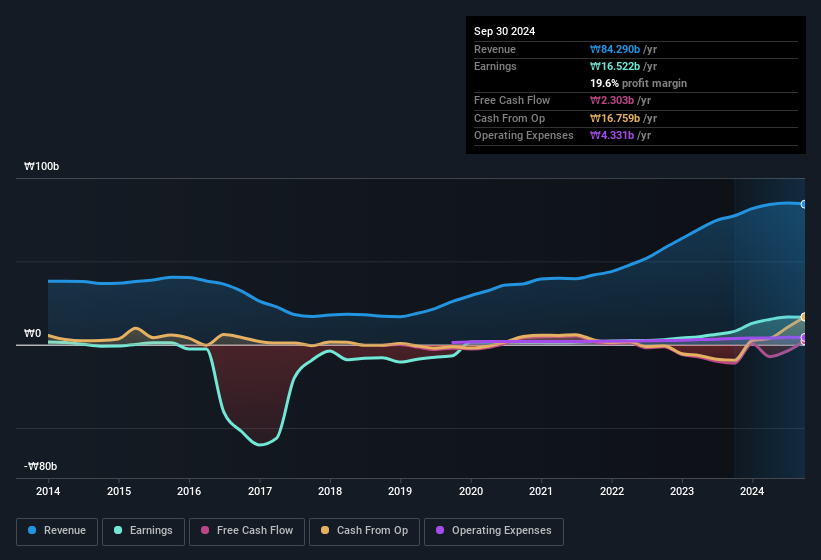
Despite announcing strong earnings, KSP Co., Ltd.'s (KOSDAQ:073010) stock was sluggish. We think that the market might be paying attention to some underlying factors that they find to be concerning.
Check out our latest analysis for KSP

A Closer Look At KSP's Earnings
In high finance, the key ratio used to measure how well a company converts reported profits into free cash flow (FCF) is the accrual ratio (from cashflow). In plain english, this ratio subtracts FCF from net profit, and divides that number by the company's average operating assets over that period. You could think of the accrual ratio from cashflow as the 'non-FCF profit ratio'.
Therefore, it's actually considered a good thing when a company has a negative accrual ratio, but a bad thing if its accrual ratio is positive. While it's not a problem to have a positive accrual ratio, indicating a certain level of non-cash profits, a high accrual ratio is arguably a bad thing, because it indicates paper profits are not matched by cash flow. To quote a 2014 paper by Lewellen and Resutek, "firms with higher accruals tend to be less profitable in the future".
KSP has an accrual ratio of 0.21 for the year to September 2024. Therefore, we know that it's free cashflow was significantly lower than its statutory profit, which is hardly a good thing. In fact, it had free cash flow of ₩2.3b in the last year, which was a lot less than its statutory profit of ₩16.5b. Given that KSP had negative free cash flow in the prior corresponding period, the trailing twelve month resul of ₩2.3b would seem to be a step in the right direction. Unfortunately for shareholders, the company has also been issuing new shares, diluting their share of future earnings.
Note: we always recommend investors check balance sheet strength. Click here to be taken to our balance sheet analysis of KSP.
In order to understand the potential for per share returns, it is essential to consider how much a company is diluting shareholders. As it happens, KSP issued 11% more new shares over the last year. As a result, its net income is now split between a greater number of shares. To talk about net income, without noticing earnings per share, is to be distracted by the big numbers while ignoring the smaller numbers that talk to per share value. You can see a chart of KSP's EPS by clicking here.
A Look At The Impact Of KSP's Dilution On Its Earnings Per Share (EPS)
KSP has improved its profit over the last three years, with an annualized gain of 788% in that time. In comparison, earnings per share only gained 722% over the same period. And at a glance the 108% gain in profit over the last year impresses. On the other hand, earnings per share are only up 95% in that time. So you can see that the dilution has had a bit of an impact on shareholders.
Changes in the share price do tend to reflect changes in earnings per share, in the long run. So it will certainly be a positive for shareholders if KSP can grow EPS persistently. But on the other hand, we'd be far less excited to learn profit (but not EPS) was improving. For that reason, you could say that EPS is more important that net income in the long run, assuming the goal is to assess whether a company's share price might grow.
Our Take On KSP's Profit Performance
In conclusion, KSP has weak cashflow relative to earnings, which indicates lower quality earnings, and the dilution means its earnings per share growth is weaker than its profit growth. Considering all this we'd argue KSP's profits probably give an overly generous impression of its sustainable level of profitability. So while earnings quality is important, it's equally important to consider the risks facing KSP at this point in time. Case in point: We've spotted 2 warning signs for KSP you should be mindful of and 1 of them can't be ignored.
In this article we've looked at a number of factors that can impair the utility of profit numbers, and we've come away cautious. But there are plenty of other ways to inform your opinion of a company. For example, many people consider a high return on equity as an indication of favorable business economics, while others like to 'follow the money' and search out stocks that insiders are buying. While it might take a little research on your behalf, you may find this free collection of companies boasting high return on equity, or this list of stocks with significant insider holdings to be useful.
Valuation is complex, but we're here to simplify it.
Discover if KSP might be undervalued or overvalued with our detailed analysis, featuring fair value estimates, potential risks, dividends, insider trades, and its financial condition.
Access Free AnalysisHave feedback on this article? Concerned about the content? Get in touch with us directly. Alternatively, email editorial-team (at) simplywallst.com.
This article by Simply Wall St is general in nature. We provide commentary based on historical data and analyst forecasts only using an unbiased methodology and our articles are not intended to be financial advice. It does not constitute a recommendation to buy or sell any stock, and does not take account of your objectives, or your financial situation. We aim to bring you long-term focused analysis driven by fundamental data. Note that our analysis may not factor in the latest price-sensitive company announcements or qualitative material. Simply Wall St has no position in any stocks mentioned.
About KOSDAQ:A073010
Flawless balance sheet and good value.


